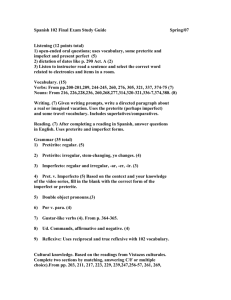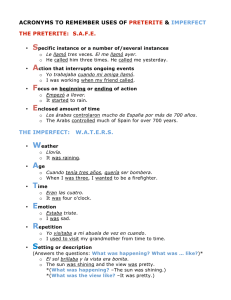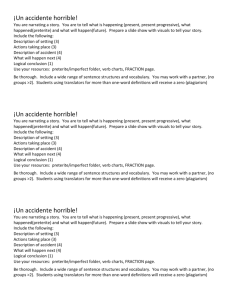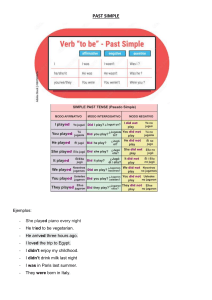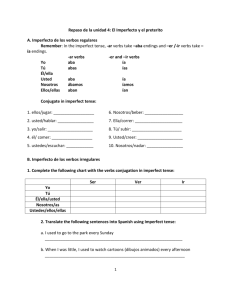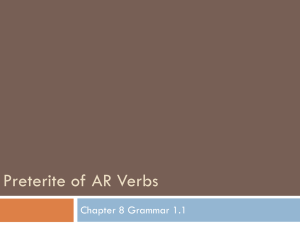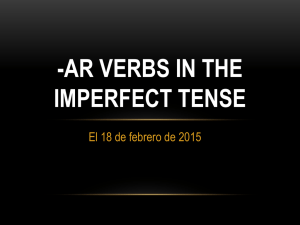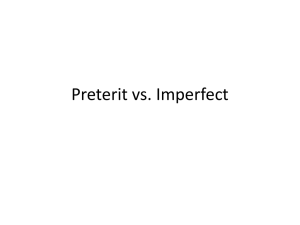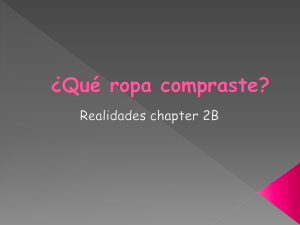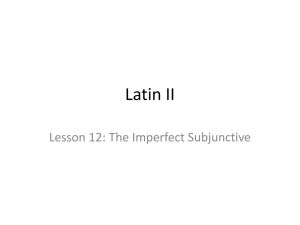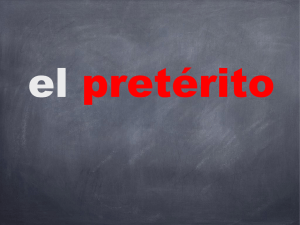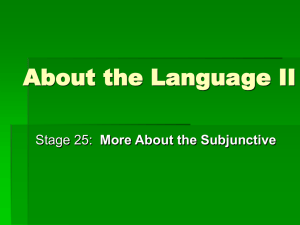PRETvsIMP PPT - Spanish4Ever
advertisement
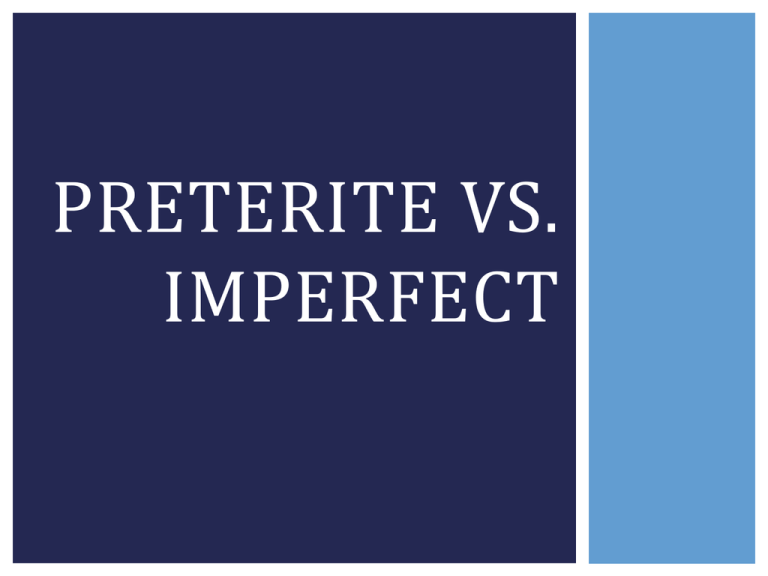
PRETERITE VS. IMPERFECT IMPERFECTO It was 9:00 at night. It was Friday. It was bad weather. It was raining. We were all at home. Mom and Dad were watching television; I was reading a StarTrek novel; my sister was talking on the phone with her boyfriend in her room. Esnupi (our dog) was sleeping behind the armchair in the living room. Eran las nueve de la noche. Era viernes. Hacía mal tiempo. Llovía. Todos estábamos en casa. Mamá y Papá miraban la televisión; yo leía una novela de StarTrek; mi hermana hablaba por teléfono con su novio en su cuarto. Esnupi (nuestro perro) dormía detrás del sillón en la sala. PRETÉRITO Suddenly, a robber entered! He went upstairs and walked down to my parent's bedroom. He looked in the room when he heard my sister's voice. He turned and went down the stairs. He tried to flee the house, but Esnupi woke up and bit the robber's leg. De repente, ¡Entró un ladrón! Pasó por la escalera y caminó hasta el dormitorio de mis padres. Miró en el cuarto cuando oyó la voz de mi hermana. Se volvió y bajó las escaleras. Trató de huir de la casa, pero Esnupi se despertó y mordió la pierna del ladrón. EL PRETÉRITO Y EL IMPERFECTO If we are talking about the past, how can we decide which past tense to use? PRETERITE -one time action -completed event This Venn Diagram sets up the basics… IMPERFECT P A S T -ongoing actions -events that used to happen EL PRETÉRITO Y EL IMPERFECTO However, there are more detailed reasons when you would use one versus the other Remembering these acronyms will help you really understand all the detailed differences: PRETERITE: BOLTS IMPERFECT: UBOAT EL PRETÉRITO B—beginning or end of an action O—one time L—lightning fast! T—transitions S—series of events BEGINNING OR END OF AN ACTION Ejemplos B O L T S empezar/comenzar—to begin/to start El hombre empezó a llorar. (The man began to cry.) Yo empecé a comer. (I started to eat.) terminar—to end/to finish Los estudiantes terminaron las pruebas. (The students finished the quizzes.) ONE TIME ACTION/EVENT Ejemplos Yo fui a la tienda la semana pasada. (I went to the store last week.) B O L T S Nosotros vimos la película anoche. (We saw the movie last night.) LIGHTNING FAST! (SUDDENLY) Ejemplos B O L T S *interruption Yo estudiaba cuando llegó mi amigo. (I was studying when my friend arrived.) De repente, ¡el enemigo apereció a la puerta! (Suddenly, the enemy appeared at the door!) TRANSITIONS (FIRST, THEN) Ejemplos B O L T S Primero me desperté y entonces me duché. (First I woke up and then I showered.) Luego, el principe y la princesa se casaron. (Later, the prince and princess got married.) SERIES OF EVENTS Ejemplos B O L T S Sara cenó, hizo la tarea y se acostó. (Sara ate dinner, did her homework and went to bed.) Fuimos de compras, compramos la ropa y regresamos a casa. (We went shopping the day, bought clothes and went home.) SOME KEY TRIGGER WORDS FOR THE PRETERITE anoche ayer anteayer un día la semana pasada el mes pasado el año pasado el lunes pasado last night yesterday day before yesterday one day last week last month last year last (Monday, Tuesday, etc….) MORE TRIGGERS FOR THE PRETERITE then luego after (afterwards) después then, after that entonces suddenly de repente inmediatamente immediately anything else that has a “mente” attached to the end that provokes a rapid response within a story (don’t confuse with the ones mentioned in the imperfect tense) EL IMPERFECTO U—“used to” B—background information O—ongoing actions A—age T—tiempo (time and weather) USED TO DO SOMETHING Ejemplos Yo siempre jugaba al fútbol cuando era niño. U B O A T (I would always play/I always played soccer when I was a kid.) Mi hermano iba a la primaria de Greenman. (My brother used to go to Greenman Elementary.) BACKGROUND INFO Ejemplos El príncipe era muy valiente. The prince was very brave. U B O A T Había mucha gente allí. There were a lot of people there. *había = there was/there were (past of “hay”; from “haber”) ONGOING ACTIONS Ejemplos U B O A T Ella estudiaba mientras yo tomía una siesta. She was studying while I was taking a nap. Nosotros jugábamos fútbol cuando empezó a llover. We were playing soccer when it started to rain. AGE (LA EDAD) Ejemplos Remember we use the verb TENER to talk about age! U B O A T Yo era muy bajo cuando tenía 4 años. I was really short when I was four. Mis primos tenían 6 y 8 años. My cousins are 6 and 8 years old. TIEMPO (TIME AND WEATHER) Ejemplos Eran las dos cuando llegamos. It was 2:00 when we arrived. U B O A T Hacía frío y llovía. It was cold and raining. SOME KEY TRIGGER WORDS FOR THE IMPERFECT siempre nunca Usualmente normalmente cada (año, verano) todos los días mientras los lunes generalmente con frecuencia always never usually normally each/every (year, summer) every day while on…(Mondays) generally frequently VERB ENDINGS: PRETERITE -AR -ER/-IR é amos í imos aste asteis iste isteis ó aron ió ieron VERB ENDINGS: IMPERFECT -AR -ER/-IR aba ábamos ía íamos abas abais ías íais aba aban ía ían PRACTICA: PARTE 1 I 1. hablaba _____ hablar; él/ella P 2. dije _____ decir; yo P 3. fueron _____ ir/ser; ellos I 4. iban _____ ir; ellos I 5. veías _____ ver; tú P 6. di _____ dar; yo P 9. tuviste _____ tener; tú I 10.eras _____ ser; tú I 11.hizo _____ P 7. comíamos _____ comer; nosotros hacer; él/ella P 12.trabajaba _____ I 8. comimos _____ comer; nosotros trabajar; yo/él/ella PRACTICA: PARTE 2 Choose whether the following statements would be considered preterite or imperfect in Spanish: I went to the store last night. She used to play with dolls. IMPERFECT They would always eat early. We cooked dinner at 5:00. PRETERITE IMPERFECT PRETERITE You made cookies yesterday. PRETERITE When I was 5, I ate cookies every day. IMPERFECT PRACTICA: PARTE 3 fue O 1. Yo ________________ (ir) a la tienda anoche. _____ jugaba 2. Ella ________________ (jugar) con las muñecas U cuando era niña. _____ comían 3. Ellos siempre ________________ (comer) O temprano. _____ preparamos (preparar) la cena a 4. Nosotros ________________ O las cinco. _____ hiciste O 5. Tú ________________ (hacer) galletas ayer. _____ tenía 6. Cuando yo ________________ (tener) 5 años, comía ________________ (comer) las galletas todos los días. A _____ /U
